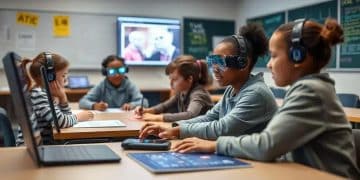Career readiness programs trends: shaping future opportunities

Career readiness programs provide students with essential skills, real-world experiences, and networking opportunities, helping them successfully transition from education to employment.
Career readiness programs trends are transforming how young individuals prepare for the job market. Have you ever wondered how these shifts impact your career path? Let’s dive into what’s changing and why it matters.
Understanding career readiness programs
Understanding career readiness programs is essential for students looking to succeed in the job market. These programs equip young people with the skills and experience needed to thrive in their careers. They focus on bridging the gap between education and employment, ensuring that students are not just academically prepared but also ready for the work environment.
Key Components of Career Readiness Programs
Programs typically include various components that enhance students’ employability. These components can range from hands-on training to soft skills development. Understanding these elements can help students make better choices about their future.
- Internship and externship opportunities
- Workshops on resume writing and interviewing skills
- Networking opportunities with industry professionals
- Skill assessments and feedback for improvement
In addition to these components, career readiness programs often collaborate with local businesses. This partnership provides students with real-world insights and helps employers identify potential hires. By engaging with employers, students gain a deeper understanding of what is expected in the workplace.
Benefits of Career Readiness Programs
The benefits of participating in these programs are numerous. Students not only receive guidance in their professional journey but also build relationships that can be vital for future job placements. Furthermore, they learn how to navigate challenges they may face in the workforce.
Ultimately, career readiness programs play a crucial role in shaping the future workforce. By preparing students effectively, these programs can have a lasting impact on both individuals and the economy as a whole. Engaging in such programs opens doors to opportunities that can significantly alter a student’s career path.
Current trends in career readiness

Current trends in career readiness reflect the changing demands of the job market. Schools and organizations are adapting to ensure that students are equipped with the skills they need to succeed. These shifts are essential to understanding how best to support future professionals.
Emphasis on Soft Skills
One major trend is the growing emphasis on soft skills. Employers now prioritize traits such as communication, teamwork, and adaptability. Programs are increasingly focused on developing these skills alongside technical knowledge.
- Workshops that teach effective communication
- Group projects to foster teamwork
- Activities that enhance problem-solving abilities
Additionally, career readiness programs are recognizing the importance of emotional intelligence. Students learn how to manage their emotions and understand others’ feelings, which is crucial in a collaborative work environment.
Integration of Technology
Another trend is the integration of technology into career readiness initiatives. Online resources, virtual workshops, and simulations are becoming standard parts of training. These tools provide flexibility and accessibility, allowing students to engage with learning materials at their own pace.
Moreover, platforms that connect students with mentors and industry experts are expanding. This digital landscape helps students gain valuable insights into various professions while building their networks.
As education continues to evolve, current trends in career readiness also highlight the importance of personalized learning. Each student’s journey is unique, requiring tailored approaches to skill development. With this focus, programs can better serve their participants by addressing individual strengths and aspirations.
Benefits of participating in these programs
Participating in career readiness programs offers numerous benefits for students. These advantages extend beyond just acquiring knowledge; they also include enhancing skills vital for future success. By engaging in these programs, students prepare themselves for the job market effectively.
Real-World Experience
One significant benefit is the opportunity to gain real-world experience. Many programs connect students with internships or job shadowing experiences that provide practical insights into various careers. This exposure allows students to understand workplace dynamics and expectations, making them more competitive candidates.
- Developing professional relationships with mentors
- Learning industry-specific practices
- Gaining confidence through hands-on activities
These experiences help students apply their learning in practical environments, which reinforces their skills and knowledge.
Skill Development
Another key area is skill development. Career readiness programs focus on teaching both hard and soft skills vital for any job. Students learn essential skills such as resume writing, interview techniques, and time management. These skills are crucial when transitioning from school to work.
Additionally, soft skills like communication and teamwork are emphasized. These interpersonal skills are often just as important as technical abilities in securing and maintaining a job. Understanding how to work well with others and communicate effectively is a cornerstone of success in the workplace.
Through participation in these programs, students effectively bolster their resumes with valuable experiences and skills that employers seek. Furthermore, they gain clarity in their career goals and interests, setting the stage for a successful future.
How to choose the right program

Choosing the right career readiness program is a crucial step for students aiming to enhance their employability. With many options available, it’s important to consider several factors to find a program that fits individual needs. This decision can significantly shape a student’s professional journey.
Assess Your Goals
Begin by defining your career goals. Understanding what you want to achieve will guide your program selection. Ask yourself questions like: What industries interest you? What skills do you need to develop? Having clear goals helps narrow down the choices.
- Identify specific career interests
- Determine necessary skills for your desired field
- Consider the type of experience you want to gain
By assessing your aspirations, you can focus on programs that align with your objectives.
Research Available Programs
Next, research the available programs. Look for options offered by schools, community organizations, or online platforms. Read reviews and testimonials to gauge the effectiveness of the programs you are considering. Pay attention to the specifics of each program, such as curriculum, length, and format.
When researching, take advantage of informational interviews with program coordinators. They can provide insights into the structure and benefits of their offerings. Also, consider talking to alumni to learn about their experiences.
Evaluate Support Services
Support services are another critical aspect of the program. Look for opportunities that offer mentoring, resume workshops, and interview preparation. These additional resources can enhance your learning experience and increase your chances of success.
Ensure that the program provides access to career counselors or job placement services. Access to these resources can make a significant difference when you start applying for jobs.
Ultimately, selecting the right program should be a thoughtful process. By evaluating your goals, researching options, and considering the available support, you can make a decision that sets you up for future success in your career.
In conclusion, participating in career readiness programs offers students many advantages. These programs not only provide essential skills for the workplace but also valuable real-world experience. By choosing the right program, students can achieve their goals and enhance their employability. With the right guidance and resources, they can navigate their career paths successfully and develop their professional networks.
FAQ – Frequently Asked Questions about Career Readiness Programs
What are career readiness programs?
Career readiness programs prepare students for the workforce by providing skills and experiences necessary for employment.
How do I choose the right career readiness program?
Assess your career goals, research available programs, and evaluate the support services they offer to find the best fit for you.
What skills can I gain from participating in these programs?
Participants can develop both hard skills, like technical knowledge, and soft skills, such as communication and teamwork.
Are there any benefits to gaining real-world experience through internships?
Yes, internships provide practical experience, helping students understand the workplace, build professional networks, and improve their resumes.





